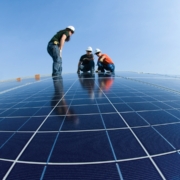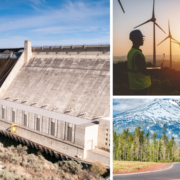It’s no wonder why solar panels are so popular. As your solar panels generate electricity effectively over time, you’ll save more money in the long run. Most residential panels operate efficiently for 25 years before any noticeable degradation in energy production. Even after this period, they still convert sunlight into solar energy, albeit at a slightly less efficient rate compared to when they were new.
Plus, the installation of this green technology can mean money-saving tax credits. In Washington and Oregon, taxpayers could see up to 26% in Federal tax credits.
The Importance of Properly Vetting Your Solar Professional
Sadly, due to rapid industry growth, incentives, and more, there’s been an increase in fraud in the solar industry.
The push to get Americans to adopt rooftop solar panels has increasingly fallen into the hands of opportunistic salespeople with limited understanding of renewable energy. Motivated by high commissions, they’re aggressively marketing solar power nationwide, often sidestepping regulations like Do Not Call lists and misleading homeowners with tactics learned from online “sales gurus.” Many operate as independent contractors, evading accountability to any specific solar company, and earn substantial profits, sometimes by exploiting elderly and low-income consumers.
If you are new to solar panels or just want to increase the longevity of your existing ones, be sure to work with certified electrical professionals and get the job done right. These professionals are rigorously trained and certified, offering expertise and ethical assurance. Choosing wisely defends against deceitful practices, ensuring a reliable and effective solar investment.
4 Reasons to Leave Solar Panel Installation & Maintenance to the Experts
While DIY solar panel installation and maintenance might seem manageable, here are four reasons to let the electrical experts handle it.
1) Safety First
There is a reason why electricians and electrical contractors are certified. Working with electrical components, including solar panels, comes with some degree of risk. Electrical professionals are well-versed in safety protocols, skilled in the latest technology, and familiar with high-voltage components.
In certain circumstances, it’s possible to install solar panels yourself. Washington State allows residential and commercial building owners to DIY their panels with the appropriate permits, for example. However, self-installation comes with a few risks and drawbacks.
- The permits and paperwork can be time-consuming and confusing. Navigating building codes and city regulations involves thorough research. Plus, if you are connecting your panels to an electrical grid, you also need to secure permission from local utility companies.
- If you are still getting familiar with solar panel setup and area coverage, you run the risk of over- or under-purchasing the number of panels you need. This requires either additional spending or more visits to the supplier.
- Improper installation can be an electrocution or fire risk.
- Some solar panel companies won’t honor warranties if DIY-installed.
Seeking out professional electrical experts means all your permits will be in order, panels will be correctly installed, and there will be a reduced risk of safety hazards. It’s important to note that the State of Oregon requires contractors and other individuals who install solar photovoltaics (PVs) to be licensed. So, any installation must be handled by a professional.
2) Optimized Power Consumption 
To maximize energy savings from solar panels, it’s crucial to calibrate them for optimal power consumption. This involves fine-tuning various parameters such as tilt angle, orientation, and shading to ensure that the panels capture the maximum amount of sunlight throughout the day. Additionally, monitoring and adjusting the system’s performance regularly can help maintain efficiency and address any issues promptly.
Electrical professionals are trained in PV cell adjustments and more to ensure optimal solar performance.
3) Diagnostics & Repairs
Like other appliances, solar panels may encounter issues requiring professional attention. Poor performance, damage, or battery malfunctions can occur. Electrical contractors can conduct a comprehensive diagnostic, inspecting cables, panels, inverters, and isolators to identify and address any problems efficiently.
4) Maintenance
The key to solar panel longevity is proper maintenance. Routine checks catch issues before they become problems. Most contractors recommend panel inspections annually. However, a maintenance schedule depends on warranties, panel age, and overall condition.
Electrical professionals can run inverter live tests and ISC checks to determine a panel’s overall performance as well as suggest a schedule based on your unique needs.
Find a Licensed Electrical Professional Near You
Solar panels are an excellent investment, so you want to ensure top electricians and contractors handle them. If you are looking for experts in the Pacific Northwest who have training on new technologies and are well-vetted in the industry, work with union members in your area.
The NECA–IBEW Local 48 partnership provides businesses, commercial building owners, and homeowners with a list of all licensed union electrical professionals in the area. Find an electrical professional in your area to ensure your solar panel needs are managed with expertise.




